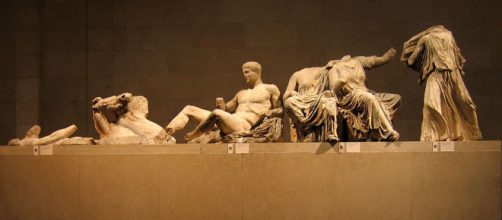Last week, Art News magazine asked a question that should be asked every week: “How did the Parthenon Marbles end up in the British Museum?” The answer tells you why the Brits need to be hassled.
What’s yours is mine
The Parthenon Marbles – a collection of stone figures carved for the Parthenon in Greece in 447 BC – were stripped from their mooring by Thomas Bruce, 7th Earl of Elgin, who sold them in 1816 to the British Museum for £35,000, close to $50,000 with Parliament’s approval.
For years, the Greeks have asked for the return of their sculptures. But their pleas were given unsympathetic treatment.
Then, this month, a UNESCO advisory committee “recommended” that the Brits re-think their stance. But there was no re-thinking. “The recommendation was bluntly rejected,” Art News noted.
How is this possible? These sculptures are stolen goods that Lord Byron mourned as the “last poor plunder” in his poem “Childe Harold’s Pilgrimage.”
The gall of Great Britain
But the museum denies the charge of plunder, insisting instead that the heist was legal, that Elgin had the permission of the occupying Ottoman Empire.” Isn’t that a little like the Nazis taking artworks owned by Jews for German museums and refusing to return them?
Yet, Prime Minister Boris Johnson is now telling the Greek newspaper Ta Nea that the marbles will never be returned.
Never? Why not? According to the British Museum, the marbles are better off there because the English are better caretakers than the Greeks.
Is that true? Art News points out that the safety of the marbles in British hands is not all that certain. Photos were taken after a heavy rain show the Greek galleries where the marbles are displayed bearing signs of leaking water.
Owing to that, the Greek culture minister, Lina Mendoni, said in a statement that the neglect is seen in the leaky museum galleries “reinforces Greece’s rightful demand for the sculptures’ permanent return.”
Even despite the UNESCO recommendation, the UK government told Artnet News that the marbles would stay put. But Mendoni doesn’t have it.
She said the Greek City Times, “Greece has a valid and legal claim to demand the return of the sculptures to their place of birth.” Good luck with that.
The real reason
The British Museum didn’t even let Greece borrow the marbles for the 2004 Olympics in Athens. Director Robert Anderson told the London Times, the loan would be “against the interests of the many visitors who flock to the British Museum.”
Aha! Therein lies the crux of the matter. The Elgin Marbles are a big draw for the British Museum. According to the Oxford University Students’ Union, the sculptures of the Parthenon “are the most famous and best-loved ancient Greek artifacts anywhere in the world.” It follows that the Brits wouldn’t want to give that bragging right up.


